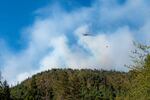
A helicopter with a bucket of water flies over the Dixon Fire, as seen in this supplied photo, posted on Aug. 13, 2024.
Courtesy U.S. Forest Service via InciWeb
Several wildfires are burning along the Interstate 5 corridor in Oregon. Here’s an overview of many of them as of Wednesday morning.
Fire officials say the Dixon Fire, which sparked near the community of Tiller east of Canyonville, has burned at least one home so far.
The fire threatened about 40 structures when it first sparked Saturday.
It’s now grown to nearly 2,000 acres.
Evacuation levels have been adjusted with 18 structures in the Level 3 “Go Now” area and 13 in the Level 2 “Be Eet” area. The most up to date evacuation orders are posted on the Douglas County Sheriff’s Office Facebook page.
Fire crews did make significant progress overnight Monday, setting up water stations at key points and mopping up hot spots near structures.
The Willamette Complex South, made up of eight lightning fires that have spread on either side of Aufderheide Drive, has been burning for nearly a month.
In a briefing Tuesday, Operations Section Chief Justin Ray said crews have been able to clear away tree debris that endangered firefighters.
That’s put them in a much stronger position to contain the Moss Mountain Fire, one of the smaller blazes in the complex, which has been burning through hazardous terrain.
“We have a few more days on prep on those lines and then we’ll be looking at having that entire fire boxed in the next few days.”
The Ore Fire, burning about seven miles Northeast of Blue River, was also about 15% contained.
Fire officials say the milder weather has helped, but heavy forest fuels are still a concern.
Willamette National Forest
Pyramid Fire
The Pyramid Fire is burning East of Middle Santiam Wilderness. It’s grown to 1,324 acres and was 72% contained. The fire was sparked during a lightning storm last month.
Ore Fire
The Ore Fire is burning about seven miles away from the community of Blue River. It’s grown to about 2,700 Acres and was 15% contained. The fire’s cause is under investigation.
South Willamette Complex
The South Willamette Complex is eight lightning caused fires that have burned a combined 12,537 acres.
Chalk Fire
The Chalk Fire has burned 5,421 acres and was 54% contained. Crews have made significant progress on containment lines over the last few days.
Coffeepot Fire
The Coffeepot fire has burned 6,078 acres and was 35% contained. It’s currently burning in a heavy timber area.
Moss Mountain Fire
The Moss Mountain Fire has burned 754 acres and was 0% contained.
208 Fire
The 208 fire is 199 acres and was 0% contained. It’s slow growing and burning through remote wilderness.
217, Tire Mountain and McKinley Fires
All three fires are fully contained and crews are patrolling to ensure nothing breaches containment lines.
A list of Willamette National Forest closures is available on the US Forest Service’s website.
Umpqua National Forest
Lane 1 Fire
The Lane 1 Fire is burning about six miles Southeast of the community of Dorena. It’s burned roughly 23,000 acres and was about 21% contained. According to Tuesday’s update, the fire had been holding to containment lines.
Homestead Complex Fires
The Homestead Complex is seven fires totaling nearly 4,400 acres burning through about 30 miles Northeast of the community of Glide. It was about 14% contained overall. The fires still burning are the Bullpup, Fuller Lake, Horse Heaven Creek, Lost Bucket, No Man, Reynolds Butte and Salmon 33 fires.
Fire officials say they’ve seen less activity on the Homestead Complex fires over the last few days and have had success holding current lines and bulldozing new ones.
Dixon Fire
The Dixon Fire is burning near the community of Tiller and has grown to an estimated 2,000 acres. The cause is still undetermined. Nearly 50 structures are under some level of evacuation with about 18 of those in a Level 3 “Go Now” evacuation area. At least one structure has been burned during the fire. Fire crews are using aircraft to fight the fire and doing what they can to protect buildings in the path of the fire.
Rogue River–Siskiyou National Forest
Middle Fork Fire
The Middle Fork Fire has grown to nearly 5,000 acres and is burning in Crater Lake National Park. It was 0% contained and has caused several significant trail and park closures. Those looking to recreate should check the National Park Service’s website for safety and closure information.